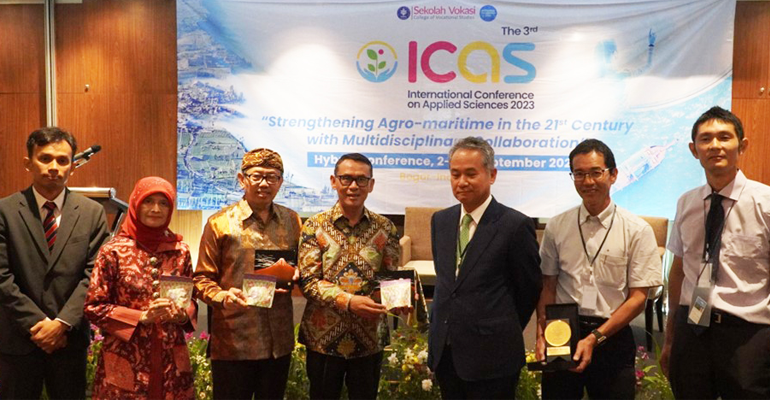IPB University Vocational School Holds 3rd International Conference on Applied Sciences Reviewing Agromaritime Sector

The Vocational School of IPB University held the 3rd International Conference on Applied Sciences (ICAS) 2023 which was conducted in a hybrid manner at SwissBell Hotel Bogor. This event is present as a forum for the exchange of the latest ideas in various sciences that will make a positive contribution to the agromaritime sector.
“The agromaritime sector is still dominant in rural development and contributes to Indonesia’s gross domestic product (GDP). This sector also acts as an economic savior in times of crisis as well as a source of food, energy and raw materials,” he said.
The event was welcomed by the Minister of Tourism and Creative Economy (Menparekraf), Dr Sandiaga Salahuddin Uno. “Very sincere appreciation for ICAS 2023 activities, because this is also one of the roles of the Ministry of Tourism and Creative Economy in the development of Indonesia’s agromaritime,” he said.
Kemenparekraf, he continued, encourages innovative and collaborative efforts to build a sustainable tourism ecosystem. Sandiaga Uno hopes that the ICAS 2023 activity can have a wider impact and benefit the tourism business, stakeholders and the community. At this event, there were four speakers from Japan and Thailand, namely Prof Hiroshi Ehara (Nagoya University), Prof. Poonpipope Kasemsap (Director of DORAS Center, Kasetsart University), Dr Jate Sathornkich (Kasetsart University) and Prof Shigehiko Suzuki (Rector of Shizouka Professional University of Agriculture/SPUA).
Prof Shigehiko Suzuki, Rector of SPUA in his presentation emphasized that universities will play a crucial role in advancing society and agriculture, especially facing future challenges, such as Society 5.0, globalization, population decline and the 100-year era. He reviewed SPUA’s important role in agriculture, forestry, tourism and superior products such as tea, oranges, melons, strawberries and wasabi.
Meanwhile, Prof Poopipope Kasemsap from Kasetsart University, Thailand emphasized the importance of international cooperation in agriculture by identifying key factors and strategic approaches to be taken.
Regarding collaboration, Dr Jate Sathornkich from Doras Center Kasetsart added that collaboration can increase knowledge, experience, networks and capacity. She mentioned that collaboration could be the key to conducting more advanced research.
“Collaboration not only facilitates advanced research, but also paves the way for new connections and sample exchanges that enable more advanced and sustainable research,” he said.
A resource person from Nagoya University, Prof. Hiroshi Ehara also discussed the changing social conditions surrounding the sago plant and its potential development in Indonesia. He said that the potential of the sago plant can be useful in various aspects such as food, building materials, bioplastics and biofuels.
“To overcome several challenges in developing the sago plant, collaboration between various stakeholders such as the government, researchers, academics, the private sector and the community is needed,” he added.
Highlighting the development of agromaritime 4.0 and its impact in overcoming the challenges of production, efficiency and environmental degradation, IPB University’s Vice Rector for Global Connectivity, Collaboration and Alumni Relations, Prof Iskandar Z Siregar conveyed the importance of collaboration with industry, the formation of scientific groups and the development of partnerships.
“Hopefully this activity can encourage participants to open opportunities to build networks and promote sustainable agromaritime 4.0,” he concluded. (*/Rz) (IAAS/Hap)



